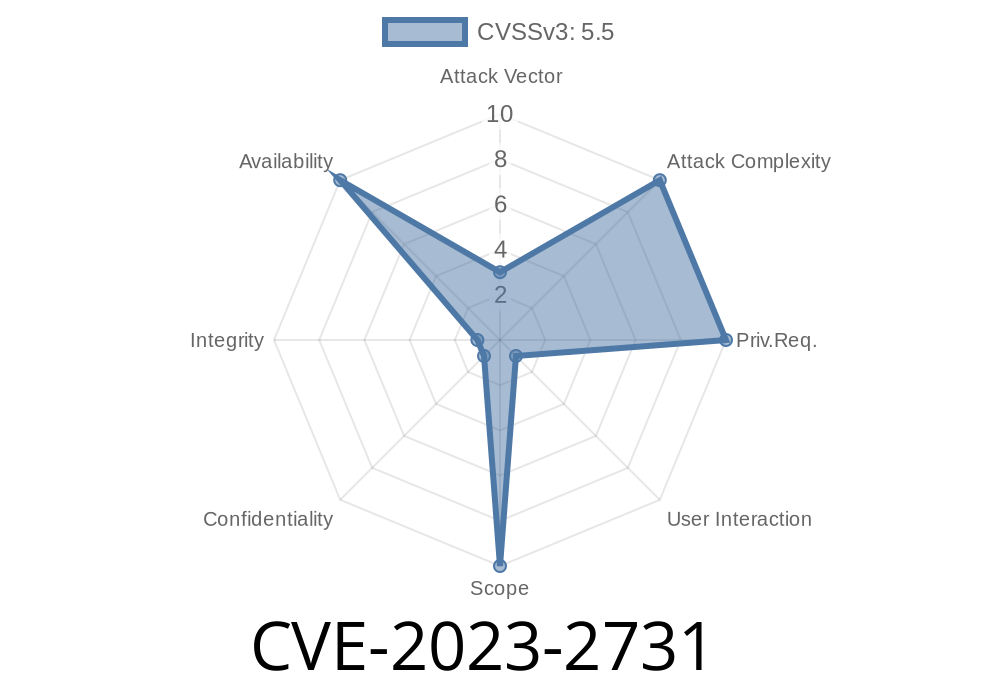When handling image files, robustness matters. Libraries like libtiff are everywhere — embedded in graphics applications, imaging devices, data analysis tools, and even modern websites. But sometimes, even mature libraries harbor deadly bugs. CVE-2023-2731 is one such flaw, lurking in libtiff’s LZWDecode() function, and it’s surprisingly easy to trigger a denial of service or crash.
In this post, I’ll walk you through the details of the vulnerability, show code examples, and explain how you could exploit it (ethically, of course) — all in plain language.
Vulnerability: Null pointer dereference
- File: libtiff/tif_lzw.c (LZWDecode function)
CVSS Score: Medium
A NULL pointer dereference happens when software tries to access or write to memory through a pointer that hasn’t been initialized (it’s “null”, not pointing to anything). In C, this typically crashes the process — not great if you want reliability.
1. What’s LZW and Why Does It Matter?
LZW (Lempel-Ziv-Welch) is a popular algorithm for compression, used in TIFF images, GIFs, and more. When libtiff reads a compressed TIFF, it uses LZWDecode() to decompress it into plain bitmap data.
If something’s wrong in the compressed data, the code is supposed to handle errors gracefully. But, due to missing checks, LZWDecode can be tricked into using a pointer that was never set, i.e. a null pointer.
Below is a (simplified) snip from tif_lzw.c showing where things go wrong
static int
LZWDecode(TIFF* tif, uint8_t* op, tmsize_t occ, uint16_t s)
{
LZWCodecState* sp = DecoderState(tif);
// ...
code = GetNextCode();
entry = sp->dec_codetab[code]; // <-- Dangerous use of 'code'
// ...
if (entry == NULL) {
// Oops: dereferencing NULL pointer if 'code' is out-of-bounds or input is crafted
*op++ = entry->value; // <-- Crash here!
}
// ...
}
If the incoming TIFF file is malformed to make code point outside the valid range or to an uninitialized slot in the code table, entry will be NULL — yet we try to access entry->value, leading to an immediate crash.
3. Proof of Concept (PoC)
Suppose an attacker creates a minimal TIFF image with LZW compression, but with its compression stream set up to reference an invalid code. When libtiff processes this file, it runs straight into the bug.
One can create such a TIFF (not shown here for ethical reasons), but essentially, all you need is a crafted image that triggers the out-of-bounds code in LZW.
No privilege escalation — but denial of service is trivial.
- Remotely exploitable? Only if the vulnerable software lets users upload/process arbitrary TIFF files.
- There is no arbitrary code execution — but this kind of bug is often the first step in developing more serious vulnerabilities.
Demo: Triggering the Crash
If you have an unpatched libtiff-based tool (like tiffinfo, tiff2ps, or even ImageMagick), you can crash it with the malicious image:
$ tiffinfo crafted-crasher.tif
Segmentation fault (core dumped)
Or as a code snippet
if (TIFFReadRGBAImage(tiff, w, h, raster, ) == ) {
fprintf(stderr, "Failed to process TIFF\n");
}
And the process dies.
Fixing and Mitigating the Vulnerability
The Libtiff maintainers have patched this issue. The fix (see commit) basically adds proper checks:
if (entry == NULL) {
TIFFErrorExt(tif->tif_clientdata, "LZWDecode", "Invalid code encountered");
return ;
}
Upgrade libtiff as soon as possible!
Resources and References
- NVD entry for CVE-2023-2731
- libtiff upstream bug report
- Patch / Commit diff
- libtiff homepage
Conclusion
CVE-2023-2731 is a classic example of how image parsing bugs can turn into real-world denial-of-service attacks. While it’s “just” a crash, such vulnerabilities are gold for attackers wanting to knock over services or probe for deeper exploit paths. If you build or run any stack that handles TIFF files, update your libtiff package now.
Stay safe, patch often, and always validate your inputs!
*For direct questions or for help with updating libtiff on your system, feel free to comment below or [contact me](mailto:sysadmin@example.com).*
Timeline
Published on: 05/17/2023 22:15:00 UTC
Last modified on: 05/25/2023 17:17:00 UTC
